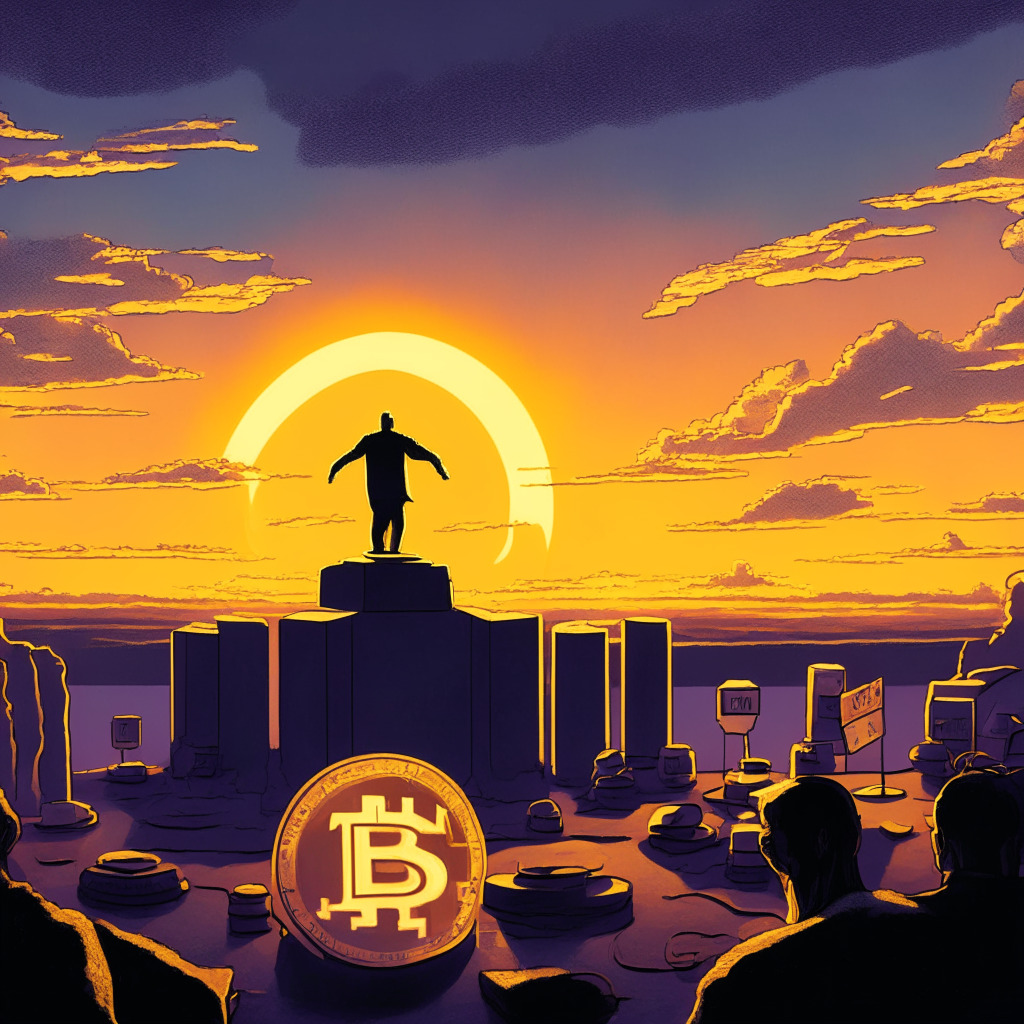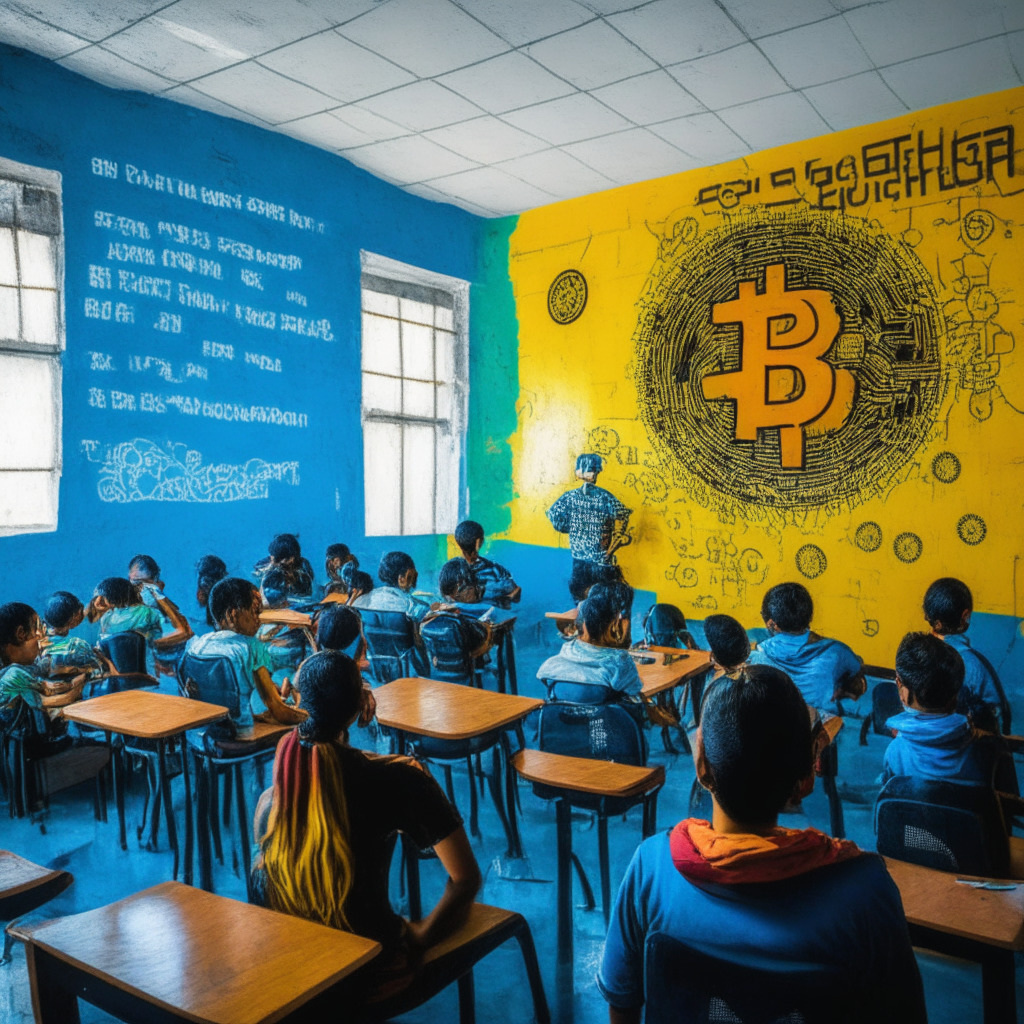The U.S. SEC nears the deadline for the approval or rejection of the first ether ETF which, according to a report by K33 Research, could cause a considerable boost in ether’s price. Comparing it to the 60% gain bitcoin experienced upon the launch of its first futures-based ETF, the analyst suggests a favorable market impact. Despite the SEC’s delay and consequent dip in bitcoin’s fortune, aggressive accumulation is recommended due to long-term potential.
Month: September 2023
Ethereum’s Struggle: Battling Market Fear Amid Shaky Support Levels
Despite Ethereum’s 31.3% price surge between March 10 and 18, there are concerns about the crypto’s ability to maintain this upward momentum. Rising bearish sentiment, decreases in key ETH price metrics, and negative market developments are troubling the ecosystem. There are fears over potential liquidation of some $4.8 billion ETH deposits held in the Grayscale Ethereum Trust, amid declining smart contract transactions and investor interest. Ethereum’s position is further pressured by its competitors like Visa integrating Solana blockchain and Coinbase planning to convert old versions of USDC to a new format.
Grayscale vs SEC: The Crypto ETF Dispute Echoing Across Regulatory Landscape
Grayscale Investments argues there’s “no basis” for the SEC’s refusal of its Grayscale Bitcoin Trust (GBTC) conversion into an ETF. The argument raises questions about the SEC’s decision-making process, suggesting potential inconsistencies. This highlights an ongoing debate within the crypto and regulatory spheres about balancing regulation and technological advancement. The final decision will set a precedent for future cryptocurrency regulation.
Coinbase Steps into Crypto Lending for Institutions: A Brave New Venture or Risky Endeavor?
Coinbase has introduced a new crypto lending service aimed at institutional clients in the U.S, in a move to replace fallen players such as Genesis and BlockFi. The service allows clients to lend money in crypto assets with more collateral than the loan amount, adjusted daily. This initiative has already raised over $57 million. Unlike similarly failed services, the focus here is strictly on institutions, which provides a safety net against previous issues. However, critics express concerns about its potential to expose institutions to extra risks due to crypto volatility.
Rise of Crypto Staking Amidst Gloomy Blockchain Atmosphere: Can It Be the Future?
“Staking in the crypto world is showing resilience amidst a challenging year, with a 292% surge in total value locked (TVL) for liquid staking protocols. Ethereum staking is recovering, especially due to the ‘Merge’ event that transitioned Ethereum to live staking platform. It’s compared with the ‘on-chain equivalent of government bonds’, promising a safer alternative than DeFi lenders.”
Bitcoin’s Volatility and Promising Altcoins: A Roller Coaster Ride in Cryptocurrency Market
“While Bitcoin attempts to break its current trading range, the market volatility dwindles around $26,000. Doji patterns on the weekly chart suggest ambivalence regarding Bitcoin’s future trajectory. Altcoins like Toncoin, Chainlink, Maker, and Tezos show dynamic movements, suggesting potential breakout with volatility as the game’s name.”
Oxford’s JAX-LOB: Facilitating AI Trading and Reshaping Financial Markets
A multidisciplinary team from the University of Oxford developed JAX-LOB, the first GPU-accelerated limit order book simulator. Using JAX, a high-performing machine learning system by Google, the simulator enables AI training directly on financial data, potentially revolutionizing the financial world.
The $700 Million Legal Bill: How Unclear Crypto Regulations Fuel High Legal Fees in Bankruptcies
“The report reveals $700 million spent by lawyers and consultants following the collapse of several digital asset firms, renewing discussions around the complexity of digital asset regulations. With companies like FTX and Celsius amounting $326.8 million and $186.5 million in legal fees respectively, the lack of clear regulations is leading to increased costs and uncertainty, potentially hindering the adoption of cryptocurrencies by new investors.”
Exploring the Potential of RLN in Harmonizing CBDC with Commercial Bank Money
The Regulated Liability Network (RLN), a U.K. based financial marketplace infrastructure, is working on a use case involving the consumer domestic payment case with the central bank digital currency (CBDC). Exploring how commercial bank money and CBDC could coexist, the RLN aims to maintain equilibrium between the two. The network further mitigates authorized push payment fraud and quickens settlement time. Despite the complexity of regulations and jurisdictions, systems like RLN are key to a seamless digital economy transition.
Altcoins Suffer While Bitcoin Gains: Analyzing Recent Crypto Fund Flows and Their Implications
Crypto-backed funds saw minor outflows of $11.2 million last week, led by altcoin, particularly MATIC-backed funds. Despite ETH funds and short-Bitcoin funds also recording withdrawals, BTC funds had inflows totaling $3.8 million. Overall, despite market fluctuations, crypto investment products have a year-to-date inflow.
The Ethereum Supreme Court: A Radical Notion to Enhance Blockchain Safety and Stability
Matter Labs CEO, Alex Gluchowski, suggests the creation of an “Ethereum Supreme Court” to mediate disputes that could impact the Ethereum blockchain’s integrity. His proposed system aims to formalize Ethereum’s “social consensus layer” to safeguard platforms against exploitation, enabling community-engaged contract-based mediation in crisis scenarios.
The Paradoxical Rise of Liquid Staking: A Shift in DeFi Amid Regulatory Pressures and Yield Quests
“Liquid staking protocols, particularly Lido, have seen a massive rise recently despite an overall downturn in the DeFi industry. The popularity of liquid staking, driven by regulatory pressures and attractive yield returns, suggests a potential shift within the DeFi ecosystem.”
Navigating the Bitcoin Tide: Investment Strategies Amidst Turbulence in the Crypto Market
“Bitcoin’s current market capitalization stands at a colossal $500.6 billion. Despite a minor dip, its status still reigns at the top. However, forecasts warn of potential hurdles ahead, possibly pushing Bitcoin into a bearish disposition, unless significant resistances are overcome.”
MetaMask’s Bold Moves: Expanding Crypto Conversion Amid Scam Woes
MetaMask has enhanced its user experience by allowing ETH conversion to fiat currency. Despite advancements, it faces scamming challenges with fraudsters creating bogus MetaMask sites for illegal activities. Users need to be vigilant and proactive in reporting any suspicious activity or compromised security details to MetaMask.
Crypto Exchanges and Bitcoin: A New Strategy or a Conflict of Interest?
Bitfinex, a renowned crypto exchange, is reportedly keeping Bitcoin on its balance sheet, potentially converting a portion of trading fees into the cryptocurrency. This strategic move indicates an endorsement of Bitcoin’s long-term value and shows strong belief in cryptocurrencies. However, concerns have been raised over potential market sway and fairness issues.
Decentralized Exchange dydx’s Token Migration to Layer 1: A Unanimous Move or Market Hype?
“Decentralized exchange dydx gains almost universal user approval to migrate to its latest version, adopting DYDX as its Layer 1 token for its imminent blockchain. The community’s vote facilitates the token’s transition from Ethereum to a Layer 1 appchain within the Cosmos ecosystem.”
AI Regulation Debate: Need for New Federal Agency versus Inherent Impossibility
A survey conducted by Axios, Generation Lab, and Syracuse University reveals diverging opinions among computer science professors regarding AI governance. While 37% propose a dedicated “Department of AI” for regulation, 16% believe Congress should handle these AI regulations. However, there’s notable skepticism about AI’s potential to replace human tasks.
Visa Dives into Stablecoin Payments: A Futuristic Move or an Unnecessary Intrusion?
“Visa partners with Solana blockchain, venturing into stablecoin payments. This sees Visa using stablecoins like USDC and blockchain networks such as Solana and Ethereum to increase cross-border settlement speed and offer more accessible options for fund transfers via Visa’s treasury.”
Foreseeing a Bitcoin Crash: Comparing Cryptocurrency Trends and Future Stability with Stablecoins
“An ominous Bitcoin price metric that previously resulted in a -25% FTX crash is repeating, centred around the BTC rate of $25,726. Market spectators prepare for a possible drop to $23,000. The Short to Long-Term Realized Value (SLRV) ratio indicates potential sales growth in ‘older’ Bitcoins, urging caution among investors. Meanwhile, stablecoin Circle’s USD Coin (USDC) now supports smooth transitions to Base and Optimism networks.”
Crossing Bridges: USDC Expansion to Base & Optimism Networks – A Milestone or Misstep?
In a significant development, USD Coin (USDC) has expanded to Base and Optimism networks, allowing Coinbase and Circle account holders to directly transfer their USDC stablecoin to Base. However, the new native USDC struggles with full integration across networks, causing user confusion and scepticism. The future of this decentralized currency hinges on balancing innovation, competition, and user convenience.
Unraveling Genesis Global Trading’s Unexpected Exit: A Strategic Move or Crypto Collapse?
“Genesis Global Trading’s spot crypto trading platform plans to cease operations by September 18, with all trades to be settled by September 21. The somewhat unanticipated move is made for a ‘business reason’, potentially hinting at a reassessment of Genesis’s business model in the volatile crypto market. Though disconcerting, such shifts often indicate innovation and market evolution in the crypto-verse.”
Mixed Bag Future: Crypto Adoption and Skepticism Explored by World Federation of Exchanges
According to a survey by the World Federation of Exchanges, 41% of firms offer crypto services, while a third refuse due to regulatory concerns and fear of scams. Centralized exchanges record higher volumes despite higher fees, triggering skepticism about market instability and need for uniform regulations.
Labor Day Market Fluctuations: Bitcoin Declines but Solana Shines
Following Bitcoin’s recent dip to $25,700, market uncertainty pervades, driven by SEC’s delay of other Bitcoin ETF applications like BlackRock and Fidelity. Factors such as decreasing trading volume, multi-year lows in Google search trends, and record low volatility point towards a prevailing indifferent attitude. Nevertheless, with Solana’s SOL token rising and Visa’s initiative to expand settlement capabilities on blockchain, optimism still persists in crypto space.
Navigating the Tightrope: China’s Crypto Clampdown and the Global Blockchain Future
“80 Chinese accounts promoting cryptocurrency were shut down on Sina Weibo, raising concerns about blockchain freedoms. These accounts, with 8 million followers, were part of ongoing crackdowns following China’s 2021 cryptocurrency ban with primary objective of protecting property safety.”
Unveiling the Veils of DeFi: The Road to Normalization Amidst Risks and Rewards
“Cross-chain bridge Synapse experiences a value sink due to a SYN tokens dump by an anonymous liquidity provider. This highlights potential insecurities in the DeFi space, underscoring the necessity for protective measures and consistent market analysis.”
Sybil Attack on Connext Network: Exploring Security vs Convenience in Decentralized Trust Systems
The Connext Network, a protocol for native blockchain bridges, recently endured a ‘sybil attack’— a suspicious wallet exploited the protocol’s token airdrop, making over 200 claims. This unexpected event underscores the critical balance between security and convenience in decentralized trust systems.
Coinbase Upsizes Debt Repurchase Amid Financial Uncertainty: A Bold Move or a Risky Bet?
Coinbase has increased its debt repurchase initiative to $180 million indicating financial strength, despite reporting a net loss of $430 million in Q1 2022. Meanwhile, Visa expands its support for USDC settlements on Solana blockchain, potentially revolutionizing cross-border transactions despite potential risks.
VISA Leverages Solana Blockchain and USDC Stablecoin for Faster International Payments
“VISA has enhanced its stablecoin settlement ability with Circle’s USDC stablecoin on the high-speed Solana blockchain, making it one of the first financial institutions to harness Solana for scaled settlements. VISA’s integration of stablecoins like USDC on global blockchain networks aims to improve international settlements speed and give clients a modern option to conveniently transact funds.”
Rise of Bitcoin Derivative Coins amidst Shaky Crypto Market: A Focus on Bitcoin BSC
‘Bitcoin BSC’, a stake-to-earn model ‘Bitcoin clone’ derivative coin makes a striking entry, despite fluctuations in the crypto market. This efficient and scalable proof-of-stake protocol exhibits lower transaction costs and builds on BNB Smart Chain, offering potential substantial upside for early investors.
Tether’s Ascent: Top Holder of US Treasury Bills and What That Means for Crypto
“Tether, one of the world’s leading buyers of US Treasury bills, has increased its holdings to $72.5 billion. Despite the complexities expansion brings, this represents the growing mainstream acceptance of digital currencies and their incorporation into the traditional financial world.”
El Salvador’s Bitcoin Venture: Crypto Education in Schools Amidst Security and Regulation Concerns
El Salvador is incorporating Bitcoin learning programs into school curricula by 2024, in partnership with non-profit organization, My First Bitcoin (MFB), and the Education Ministry. A pilot to provide Bitcoin “base knowledge” starts September 7 with 150 teachers. The move promises a significant stride towards a crypto-literate world but also presents challenges including possible fraud and lack of uniform regulations.
Navigating the Cryptosphere: The Courting of Controversy and Confidence by Crypto Lawyer Heaver
Irina Heaver, a prominent crypto lawyer, faces scrutiny and threats due to her outspoken critique of certain altcoins and their founders. Despite these challenges, Heaver insists on informing her followers about potential lawsuits in the crypto industry and exposing questionable projects.































